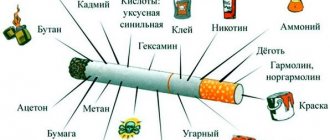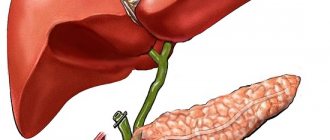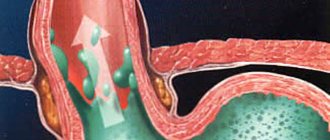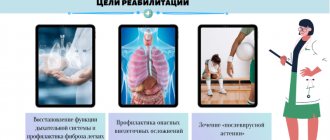Home » Relatives » Nausea after smoking cigarettes. What to do about it?
In the process of smoking, all human organs are poisoned by toxins that are contained in cigarettes. Nausea from smoking often occurs, which becomes a confirmation of a certain pathology. It is very important to determine the root cause of such a symptom as nausea, and promptly undertake treatment for alcoholism and smoking, while giving up the bad habit.
Nicotine is a legal drug
It's hard to wrap your head around it, but nicotine is a drug. Cigarettes are sold everywhere, and only in recent years have restrictions on the sale of tobacco products been tightened: it has become more difficult for teenagers to buy them; in stores, packs of cigarettes are hidden from prying eyes in special locked cabinets. Naturally, it is hard to believe that the drug can be sold in the open.
The method of drug use also plays an important role in the frivolous perception of tobacco addiction. The cigarette is easy to smoke. Even a Spartan meal for alcoholics requires minimal preparation, and you don’t need company to smoke a cigarette; you can even ask the first person you meet for a lighter. And the process itself seems harmless and safe. True, for the time being.
Withdrawal syndrome when quitting smoking
After a certain period of regular tobacco smoking, a person suddenly discovers that he has become dependent on this process.
When quitting smoking, he begins to experience obvious inconveniences. They are primarily expressed in psychological discomfort. Smokers describe this condition in different ways, but, as a rule, it is an inability to concentrate and irritability. There are also physiological manifestations that accompany nicotine withdrawal.
This whole set of unpleasant and painful symptoms is called withdrawal syndrome. It is a sign that the smoker has developed a persistent physical dependence on tobacco, or more precisely on its psychoactive component - nicotine.
Lethal dose of nicotine for humans
The lethal dose for humans is 0.5 – 1 milligram of nicotine per kilogram of weight.
When smoking one cigarette, a person receives approximately 1 milligram of this substance.
When nicotine intoxication occurs, the prognosis depends on the following factors:
- dose taken,
- age of the victim,
- general health, presence of concomitant diseases,
- duration of intoxication (before medical assistance is provided).
How does nicotine affect the body?
When smoking cigarettes, nicotine acts on the central nervous system of a person, which is where the feeling of a surge of strength, vigor, and lifting the mood arises. The psychoactive substance affects the acetylcholine receptors of the brain, which provokes an unnatural release of adrenaline.
This is how a conditioned reflex arises; a connection is formed in the psyche between smoking a cigarette and receiving pleasure. Later, when the addict wants to get rid of the disease, it will be very difficult to break it.
In the case of smoking, this reflex arc causes harm to the body. However, it is worth remembering that all rewarding reflexes are formed in this way, and this can be used not only for harm, but also for good. In the case of sports activities, the body itself rewards us with the release of joy hormones. But we can give them to ourselves consciously with the help of natural pleasures. Thus, knowledge about the formation of reflexes makes it possible to control and shape your life according to your own rules.
But in the case of smoking tobacco, the opposite happens. The release of hormones is provoked by force; the body does not receive any real benefit or pleasure. But the deceived brain still adds smoking to the list of useful and pleasant actions that bring satisfaction. This is a stable psychological dependence on a drug.
References:
- Guide to addictionology / Axelrod B. A. et al. / ed. V. D. Mendelevich. - St. Petersburg: Speech, 2007.
- Information technology for liberation from alcohol and nicotine addiction, depression / M. A. Tetyushkin / “LitRes”, 2014.
- Geppe N. A. Tobacco smoking in children and adolescents: impact on health status and prevention // Practical Pulmonology. – 2007. – No. 3. – P.15-19.
- Nicotine addiction / (psychoactive addictions) / [comp. N. N. Boyko]. – Ed. 2nd, rev. and additional / Moscow: Native Country, 2009. – 198, [1] p. : ill., table. (Russian Security).
Article verified by an expert
Terekhova Anna Vladimirovna
psychologist-consultant on socio-psychological work with addicted clients and their families. More than 10 years of experience.
Similar articles:
Art therapy in the treatment of addictions
Program according to the Shichko method
Why can't you completely control a drug addict?
Male alcoholism
Children's drug addiction
How does a person feel when quitting smoking?
When a dependent person begins to smoke regularly, a physical craving for nicotine is added to the psychological dependence.
During the period of quitting smoking, the patient experiences a strong desire to smoke, psychological discomfort is expressed in anxiety, irritability, and excessive psychological stress. The addict becomes depressed, he can be aggressive and unrestrained, it is difficult for him to concentrate on anything because thoughts about smoking constantly creep into his head.
Withdrawal syndrome when quitting smoking is an unpleasant condition from a psychological point of view, however, this is not all the tests that a smoker faces.
The first 14 days without cigarettes
The body's response to quitting smoking is most intense in the first two weeks after quitting tobacco. All symptoms that appear at this time are a consequence of the so-called nicotine fasting: the body is cleansed of nicotine, but the processes in which nicotine participated have not yet been rebuilt.
We will describe in detail, day by day, below the emotional and physical manifestations that will accompany quitting smoking, and the changes in the body at this time.
Then the symptoms will no longer change daily. A former smoker gets used to the normal state, and the changes will not be as bright and noticeable as in the first days. Therefore, further we will describe the consequences of quitting nicotine on a monthly basis.
First day
At the beginning of the journey, a person who is trying to quit a bad habit feels an emotional uplift, is determined to get rid of the addiction and is confident in future success. Against this background, the craving for nicotine is absent or easily blocked by willpower and distraction by other things.
The carbon monoxide content in the blood gradually decreases and, on the contrary, the oxygen content increases. A person feels that it has become easier to breathe; an excess of oxygen can even cause slight dizziness. For many experienced smokers, this ease of breathing becomes a revelation.
Some experience a decrease in appetite, weakness, and slight anxiety. You may have difficulty falling asleep or have trouble staying asleep.
Quite often it is recommended to keep a diary to record all stages of the addiction recovery process.
Second day
Symptoms of nicotine starvation begin. A severe cough and shortness of breath appear.
The ciliated epithelium of the lungs begins to restore its functions. Sputum production is reduced. The inflamed intestinal mucosa begins to regenerate. Appetite decreases, and mild abdominal pain may occur. There may be an increased urge to urinate.
There is almost no change in the psychological state. The person is still on the rise, but slight irritability appears, which is quite easy to suppress with an effort of will. Self-hypnosis techniques help, constant reminders to yourself why the decision was made to quit (recovery).
Sleep is often restless; nervousness and obsessive thoughts can cause problems falling asleep. You may feel drowsy during the day.
The third day
The tone of blood vessels increases, blood supply to the heart and brain improves. Regeneration of the bronchial mucosa begins, normalization of the pancreas.
The physical craving for cigarettes decreases slightly. While these changes are invisible, they occur at the cellular level.
The skin becomes dry, begins to peel, and small pimples (dry) may form.
Appetite increases, cravings for sweets appear (or intensify). Heartburn may bother you.
Some people experience tinnitus, dizziness, and a feeling that their heart is “squeezing.” Symptoms of psychological dependence intensify. A former smoker becomes more and more nervous, it is difficult for him to concentrate on anything, his thoughts always return to the cigarette.
Fourth
By this time, dizziness usually goes away, and the blood supply to the brain normalizes. But I still have concerns about tinnitus and surges in blood pressure. The face and fingers may swell.
Cough continues; Often a person has the feeling that there is a viscous mucous lump in the throat - the latter means that a restructuring of the system for producing bronchial secretions is taking place in the bronchi.
Emotionally, aggressiveness decreases and depression goes away. Many patients at this stage say that they expected more serious manifestations of nicotine withdrawal.
The sleep is still disturbing and superficial. Increased appetite and cravings for certain foods persist.
Fifth
Regeneration of the respiratory system continues, normalization of the functionality of the bronchi and lungs. But you still feel a lump in your throat, and dark mucus may come out when you cough
By this time, little remains of the emotional high of the first day. There is a risk of breakdown, which is further facilitated by deteriorating health. It is important to remember that all quitters experience this, and many quite successfully.
Small microcracks begin to disappear from the surface of the tongue. The perception of taste is restored.
Sixth
The functioning of the stomach and pancreas continues to normalize. Increased thirst often appears, and with it frequent urination. Some people experience bitterness in the mouth and painful sensations in the liver area. Appetite is reduced.
Many people note sweating, dry mouth, trembling hands, and nausea during this period.
Those who quit smoking become nervous, aggressive, and sometimes whiny. Every little thing causes an emotional reaction, and self-control decreases. You can consult your doctor and start taking anti-anxiety medications.
Seventh
The body is rebuilding to work without nicotine, although mucus continues to be released when coughing, and the feeling of a lump in the throat has not yet gone away. There may be occasional bowel movements. Fatty foods are poorly accepted (heartburn may occur), but overall appetite increases. The skin remains dry and flaky.
“Cigarette syndrome” and other provoking situations.
Tenth
Internal motivation is falling, so now those who quit smoking really need the support and encouragement of loved ones and those around them. A person can hardly tolerate people smoking nearby.
The restoration of the immune system begins. The cough continues. If light yellow or gray clots come out during a cough, you should definitely contact an otolaryngologist. A cough can be softened with a warm drink.
Eleventh
More oxygen enters the body, which can cause dizziness, trembling of fingers, and headaches.
Emotional sensitivity, temper, or vulnerability for any reason persists.
There is a desire to test yourself by smoking “just one cigarette” and remember its taste. At the same time, the smell of tobacco smoke is disgusting.
Appetite is still increased.
Twelfth
The condition of the skin improves, largely due to the normalization of blood circulation. A healthy complexion returns.
The cough softens, and chronic inflammation in the lungs gradually disappears. Intestinal functions are restored.
The neuropsychic state has not yet improved, which means that the person still greatly needs the support of loved ones.
Thirteenth
Malaise of uncertain localization may occur, a feeling of heaviness in the back of the head, and weakness may appear. There are surges in blood pressure.
Usually during this period a person strives to reach the two-week mark, so the risk of relapse is not very high - the desire to take a cigarette is suppressed by this desire.
Fourteenth
The cough begins to subside, the complexion continues to improve, and the yellow coloring of the fingers goes away. Vegetative-vascular disorders may still be present - lethargy, drowsiness, weakness.
Two weeks is the first serious milestone, and it is psychologically important not to break down on this day. A common mistake is to assume that one cigarette after 14 days of abstinence will not harm. In fact, it can derail the entire smoking cessation process.
Physiological manifestations of withdrawal syndrome
Let's not forget that nicotine is a real poison. It poisons the human body and causes great harm to it.
During the period of nicotine withdrawal, the body also has a hard time. A smoker develops severe headaches and may develop seizures. A classic symptom of abstinence, characteristic of many addictions, hand tremors, also awaits a nicotine addict.
The functioning of the gastrointestinal tract is abnormal. On the one hand, there is an increase in appetite, on the other hand, the smoker suffers from nausea. Sometimes the patient may experience constipation. A rapid heartbeat is accompanied by sharp changes in blood pressure, shortness of breath appears, as if the person does not have enough air when breathing. A state of general weakness and weakness complements this bouquet of symptoms.
And the method of using the drug itself harms the respiratory system, so when you quit smoking, a strong cough occurs, and ulcers may appear in the mouth. During the period of withdrawal syndrome, a smoker's overall level of immunity decreases. The immune system decides that it is possible to “relax”, because so many poisons no longer enter the body. Together with the damage caused by smoking to the respiratory organs, this leads to bronchitis, laryngitis, and rhinitis. When a person smokes, his bronchioles are in a state of prolonged spasm; accordingly, during the period of withdrawal syndrome, they expand, and infections penetrate through them more easily.
How to deal with this?
What to do if you feel sick from cigarettes? You already know the answer - quit smoking! A severe attack of nausea can be eliminated by drinking strong sweet tea or cool water with lemon juice. If nausea occurs regularly, have something on hand to eat it up. For example, a cracker or a lollipop.
Doctors also recommend drinking more fluids to cleanse the body, eating a balanced diet, normalizing your daily routine, and remembering to undergo regular examinations with a therapist and gastroenterologist.
Treatment of nicotine withdrawal syndrome
We have described a number of physical and psychological symptoms that accompany smoking cessation. This is how the body adjusts to a normal mode of operation without the use of nicotine. This is a lot of stress for a person, for his body and psyche. Therefore, few people can go through the pangs of nicotine withdrawal on their own. The best thing to do in this case is to consult a doctor.
After all, it can be a shame when a patient, having endured the most painful first days or weeks of nicotine withdrawal, then smokes a cigarette again. So he dooms himself to walking in circles.
Modern narcology offers many ways to combat nicotine addiction, varied and effective. Why not make it easier for yourself to quit smoking?
Cigarette withdrawal: how to survive
Breaking free from nicotine addiction is a difficult stage.
During the adaptation period without using cigarettes, the smoker needs to learn to live without the stimulation of nicotine. A factor that will distract him from the addiction will help him cope with this; this could be the birth of a child, the emergence of a love relationship, illness, etc., the motivation can also be saving money.
Smoker withdrawal is better tolerated in the fresh air; it’s good to spend this time outside the city, do physical exercise, and sleep more. It is necessary to balance your diet with foods rich in vitamins and minerals; food should be light and nutritious, contain more vegetables and fruits. Take plenty of fluids, visit the sauna.
During colds, all the body's reserves are aimed at fighting infection, so at this time it is easier to quit smoking, the severity of the desire to smoke decreases, and sometimes, against the background of illness, an aversion to cigarettes appears.
Why is treatment for nicotine addiction necessary?
When smoking, nicotine interferes with the body's metabolic processes and becomes an integral part of metabolism. Every cell of the body, even indirectly, experiences its impact. First of all, of course, nicotine addiction has an effect on the central and peripheral nervous systems of a person.
Nicotine acts on brain receptors, unnaturally stimulating nerve cells, stimulating the endocrine glands, in particular the pituitary gland. Subtle and complex metabolic processes are stimulated excessively, the body gets used to this state, and it becomes normal for it.
In fact, a smoker who has developed a persistent addiction does not smoke for pleasure, but to return to his “normal” state.
Naturally, such deep attachment is not easily overcome. Withdrawal syndrome when quitting smoking can break anyone, so the body needs to be helped to get through this difficult period, especially since there are plenty of funds for this today.
Causes of dizziness
After smoking you may feel dizzy. This happens for reasons:
- Vasoconstriction caused by the effect of nicotine on the body leads to oxygen starvation of the body and destruction of brain cells.
- Taking frequent breaths while smoking can lead to hyperventilation (increasing oxygen and decreasing carbon dioxide). Excessive amounts of oxygen can cause deterioration in health and can also cause dizziness.
Risk factors
Risk factors that increase the risk of nausea and dizziness after smoking:
- excess weight;
- alcoholism;
- poor nutrition.
Treatment with drugs
When treating nicotine addiction, specialists quite often turn to medicinal treatment methods. It should be noted that in essence these methods are coding for smoking.
By themselves, they cannot cure addiction, but they give the patient the opportunity to live without cigarettes and appreciate the benefits of a healthy lifestyle. Secondly, drug blocking of addiction in combination with psychotherapeutic treatment methods can cure the disease completely. In addition, medications alleviate or relieve withdrawal symptoms when quitting smoking, and a person goes through the period of adaptation to life without cigarettes more easily.
What medications are used to relieve nicotine addiction? They can be divided into two types of drugs. Some are replacement therapy and simulate the flow of nicotine into the body. The most common of these products is the anti-nicotine patch.
The person who uses the patch does not experience withdrawal symptoms. If the remedy is chosen correctly, then the body is easy to deceive; the body does not even suspect that you no longer smoke. What does it mean to choose correctly? It is important to consider how strong cigarettes you smoke, in what quantity and how often. In other words, the patch should imitate your smoking regimen as accurately as possible.
It is best to select an anti-nicotine patch with the help of a doctor, because this very convenient and effective remedy may not help you only because of the wrong dosage. In addition to the patch, there are also sprays, chewing gums, and mouth rinses that have a similar effect. Their disadvantage is that you can violate the regimen and forget to use them, which will negate the effect of the treatment. In this regard, the patch is the most convenient solution.
There are drugs that block receptors in the brain, those that respond to nicotine entering the body. Thus, the smoker does not experience any sensations from the smoking process, which makes it meaningless.
A fairly large group of drugs works to reduce cravings for tobacco. In fact, these medications relieve the unpleasant psychological manifestations of withdrawal symptoms, which will allow the patient to control their behavior.
Please note that many drugs have side effects. In addition, for the correct choice of medication, it is necessary to take into account the specific medical history of the disease. That is why the choice of treatment for smoking should be entrusted to a professional so that it brings benefit to your health and not additional harm.
Nicotine withdrawal
Chronic smoking is defined in medicine as tobacco or nicotine addiction.
Nicotine is a psychoactive substance that causes physical dependence at the level of neurotransmitters, causing the production of dopamine in the brain. Dopamine is responsible for joy, pleasure, determination. A drop in dopamine levels stimulates a person to actively search for ways to increase it. Since the smoker’s brain experiences a constant deficiency of this neurotransmitter, only the intake of nicotine in the body raises this level. When dopamine levels drop, a person experiences feelings of anxiety, restlessness, and an automatic urge to smoke.
Psychotherapeutic treatment
If a person wants to get rid of the very root of the disease, from internal psychological causes, a psychotherapist or psychologist will help him with this. This process may take several weeks or months, but it is worth it.
With the guidance of a professional, you will understand what exactly pushed you down the path of addiction and you will be able to get rid of bad habits of thinking and attitudes. A specialist will help you get used to life without the use of artificial stimulants, using psychotherapeutic techniques for treatment.
First aid for nicotine poisoning
If signs of nicotine poisoning appear, you should immediately call an ambulance. Before the doctors arrive, the following measures should be taken:
- Place the victim on the floor or other horizontal surface. To prevent vomit from entering the respiratory tract, you need to turn it on its side.
- To make breathing easier, you need to unfasten the collar of your clothing and loosen the belt.
- If the person remains conscious, you need to give him a weak solution of potassium permanganate to drink, which will provoke gag reflexes.
- After cleansing the stomach, it is necessary to give the victim activated carbon or another sorbent used for poisoning.
- You need to constantly talk to the patient, preventing him from falling asleep.
When the medical team meets, it is necessary to inform about the approximate dose of nicotine consumed and the measures already taken. Mild intoxication can be treated at home or on an outpatient basis. But if the victim’s condition may threaten his life, then treatment will be carried out in a hospital.
Treatment of nicotine addiction in
You can receive treatment for nicotine addiction in our drug treatment center. The advantage of this choice is that we cooperate with the best clinics in Russia and can offer a large number of methods for quitting smoking. As you have already noticed, an individual approach in treating this addiction is extremely important.
Most smokers delay seeing a doctor, either postponing solving the problem for an indefinite period of time, or making numerous fruitless attempts to get rid of the disease on their own. This, of course, is the right of every person, it is even spelled out in the laws of the Russian Federation. But your body suffers irreversible damage. I wouldn’t want to scare anyone, however, during this time you may develop some serious disease, sometimes incurable.
Therefore, there is no need to take risks; now treatment for addiction can be carried out gently and painlessly if you use the qualified help of a narcologist. You can learn more about the treatment of nicotine addiction from our consultants at any time. The toll-free call center number is listed on the page, call and ask your questions, because this does not oblige you to anything.







